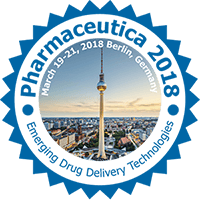
Janina-Miriam Noy
The University of New South Wales, Australia
Title: Direct polymerization of the novel arsenic drug PENAO to obtain polymeric nanoparticles for the treatment of sarcoma
Biography
Biography: Janina-Miriam Noy
Abstract
Recent investigations have shown the anti-cancer efficiency of PENAO, a second generation hydrophilic organoarsenical, towards a range of cancer cell lines and in a phase I/IIa dose escalation study in patients with solid tumours. However, the efficacy of PENAO – like most metal-based drugs – is limited by several factors such as high systemic toxicity, development of drug resistance, and rapid deactivation by complexation with proteins or oxidation reactions. Conjugation of drugs to a nanocarrier is an alternative strategy that overcomes many of these limitations. Polymeric nanoparticles for the delivery of chemotherapeutics has been widely proposed to prolong circulation time in the blood stream, to increase the specific retention in solid tumour tissue (enhanced permeability and retention (ERP) effect), and to avoid the recognition by the mononuclear phagocyte system. Herein, the direct synthesis of polymeric micelles, based on the novel arsenic drug PENAO is presented. PENAOs arsenous acid residue remains active when incorporated into a polymer matrix and conjugates to small mono and closely spaced dthiols, showing no significant difference in efficiency between PENAO containing polymers, PENAO containing nanoparticles and PENAO itself. Furthermore, the more stable micelle structures induce apoptosis in sarcoma cells and enhanced cytotoxicity and cellular uptake compared to the free drug. As a result, PENAO containing nanoparticles show great potential for further investigations into the biomedical arena and increasing the concentration of PENAO within the polymeric nanoparticle could improve antitumor efficiency, which leads to an auspicious outcome towards sarcoma cells.

